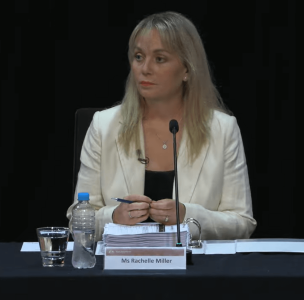An attempt to silence Robodebt victims? Royal commission unearths terrifying details
- Replies 10
In the aftermath of the government’s error-ridden debt recovery program known as Robodebt, an official inquiry has uncovered alarming evidence.
Rachelle Miller, a former Media Adviser to the former Human Services Minister, Alan Tudge, revealed to the royal commission on Robodebt that the personal information of some victims was deliberately leaked to the media in an attempt to stop widespread criticism of the program’s flaws — including targeting those who spoke out.
Tudge, currently the Shadow Minister for Education, led the former Coalition government’s social services portfolio from 2016-2017, during which Miller served under him.
She was the media liaison for human services at the time when concerns on Robodebt came to light.
Miller told the commission that they were aware of the ‘proliferation’ of unfavourable press coverage and that they noted the ‘growing and growing’ reportage was ‘predominantly in the left-wing media’.
‘We weren't too concerned because it wasn't unusual that the left-wing media were attacking us regarding social policy,’ she said.

Despite this, Miller said that the critical media coverage prompted a response that involved ‘more friendly media’.
Justin Greggery KC, Senior Assisting Counsel at the commission, asked at one point: ‘You said the media demand was very high …(it) was generally adverse … heavily critical. Would you say that… the media situation was in crisis mode?’
‘Yes,’ she admitted, ‘But I didn't think it was not able to be shut down.’
‘The Prime Minister (Malcom Turnbull) was unhappy with the escalating media issue around (Robodebt) … we were trying to contain it.’
Miller claimed that the growing public fallout spurred Tudge to instruct her to orchestrate a response.
‘I developed a crisis media strategy at the request of the minister — he was very firm with me that I needed to shut this story down,’ she said.
‘That involved … placing stories with the more friendly media, the right-wing media, about how the Coalition was actually catching people who were cheating the welfare system.’
According to Miller, her scheme had some success, especially in ‘key’ Coalition seats such as Western Sydney. However, the critical media coverage continued.
‘We had a continued crisis in the left-wing media that wasn’t seeming to die down,’ she said.
This prompted a rather drastic response from the Coalition-led government as Miller revealed: using ‘case studies’ to discourage people from speaking out.

‘The minister requested the file of every single person who appeared in the media … you could see the exact transactions that they'd had with Centrelink,’ she said.
‘This would send a clear message … that maybe consider (going to the media) twice.’
‘There were less people speaking out in the media, which was our intention.’
Miller also said that her strategy also involved retaliation at the Labor party by looking for debts traceable when they held majority power in government
‘The minister was really, really… forceful about obtaining these case studies. He was very adamant with me that I needed to hunt as many case studies as I could,’ she said.
‘That was to throw back to Labor that: ”You would let these guys go.”’
Tudge has yet to publicly comment on Miller’s allegations.
The two were previously mired in controversy when Miller lodged a formal complaint against Tudge (notably involving Senator Michaelia Cash) in 2020 citing unfair work treatment.
She also claimed a year later that Tudge was physically and emotionally abusive towards her, alleging in one instance Tudge swore at her and kicked her out of bed.
Miller received a $650,000 settlement from the Federal Government for her claims.
Tudge for his part said he rejects liability for the program’s failures, including responsibility for ensuring that Robodebt was legal.
Watch Miller’s testimony below starting at the 1:50:37 mark.
Source: YouTube/Robodebt Royal Commission
Robodebt, a scheme started in 2015 to recover money from Australians said to owe the government.
The alleged debts that welfare recipients received were the result of income averaging, where a person’s reported income was compared with Australian Tax Office records.
While on paper the concept sounds promising, it resulted in many claims of people being billed for incorrect balances.
In some cases, people were billed as much as $65,000 in payment.
An estimated 433,000 people shelled out a total of $2 billion in payments now recognised as unlawful.

The program was shut down in 2020, with hundreds of thousands of then-existing debts waived by the government citing the shaky legal ground of using average income as the basis of debt.
Meanwhile, a $1.8 billion settlement was doled out in 2022 to around 430,000 people who filed a class action suit against Robodebt.
It is expected that the final results of the royal commission’s inquiry will be out by April 13.
Still, for some families, the resolution to the scandal is too late.
If you or anyone you know are struggling with debt, we highly encourage getting in touch with the National Debt Helpline at 1800 007 007.
If you have time, you might also want to check out these stories:
Tell us your thoughts below!
Rachelle Miller, a former Media Adviser to the former Human Services Minister, Alan Tudge, revealed to the royal commission on Robodebt that the personal information of some victims was deliberately leaked to the media in an attempt to stop widespread criticism of the program’s flaws — including targeting those who spoke out.
Tudge, currently the Shadow Minister for Education, led the former Coalition government’s social services portfolio from 2016-2017, during which Miller served under him.
She was the media liaison for human services at the time when concerns on Robodebt came to light.
Miller told the commission that they were aware of the ‘proliferation’ of unfavourable press coverage and that they noted the ‘growing and growing’ reportage was ‘predominantly in the left-wing media’.
‘We weren't too concerned because it wasn't unusual that the left-wing media were attacking us regarding social policy,’ she said.

The Robodebt scandal had many Aussies shocked at receiving erroneous debt notices. Image Credit: Pexels/Mikhail Nilov
Despite this, Miller said that the critical media coverage prompted a response that involved ‘more friendly media’.
Justin Greggery KC, Senior Assisting Counsel at the commission, asked at one point: ‘You said the media demand was very high …(it) was generally adverse … heavily critical. Would you say that… the media situation was in crisis mode?’
‘Yes,’ she admitted, ‘But I didn't think it was not able to be shut down.’
‘The Prime Minister (Malcom Turnbull) was unhappy with the escalating media issue around (Robodebt) … we were trying to contain it.’
Miller claimed that the growing public fallout spurred Tudge to instruct her to orchestrate a response.
‘I developed a crisis media strategy at the request of the minister — he was very firm with me that I needed to shut this story down,’ she said.
‘That involved … placing stories with the more friendly media, the right-wing media, about how the Coalition was actually catching people who were cheating the welfare system.’
According to Miller, her scheme had some success, especially in ‘key’ Coalition seats such as Western Sydney. However, the critical media coverage continued.
‘We had a continued crisis in the left-wing media that wasn’t seeming to die down,’ she said.
This prompted a rather drastic response from the Coalition-led government as Miller revealed: using ‘case studies’ to discourage people from speaking out.

Miller alleges that they resorted to drastic means to counter intense media coverage of the Robodebt program’s woes. Image Credit: Pexels/RODNAE Productions
‘The minister requested the file of every single person who appeared in the media … you could see the exact transactions that they'd had with Centrelink,’ she said.
‘This would send a clear message … that maybe consider (going to the media) twice.’
‘There were less people speaking out in the media, which was our intention.’
Miller also said that her strategy also involved retaliation at the Labor party by looking for debts traceable when they held majority power in government
‘The minister was really, really… forceful about obtaining these case studies. He was very adamant with me that I needed to hunt as many case studies as I could,’ she said.
‘That was to throw back to Labor that: ”You would let these guys go.”’
Tudge has yet to publicly comment on Miller’s allegations.
The two were previously mired in controversy when Miller lodged a formal complaint against Tudge (notably involving Senator Michaelia Cash) in 2020 citing unfair work treatment.
She also claimed a year later that Tudge was physically and emotionally abusive towards her, alleging in one instance Tudge swore at her and kicked her out of bed.
Miller received a $650,000 settlement from the Federal Government for her claims.
Tudge for his part said he rejects liability for the program’s failures, including responsibility for ensuring that Robodebt was legal.
Watch Miller’s testimony below starting at the 1:50:37 mark.
Source: YouTube/Robodebt Royal Commission
Robodebt, a scheme started in 2015 to recover money from Australians said to owe the government.
The alleged debts that welfare recipients received were the result of income averaging, where a person’s reported income was compared with Australian Tax Office records.
While on paper the concept sounds promising, it resulted in many claims of people being billed for incorrect balances.
In some cases, people were billed as much as $65,000 in payment.
An estimated 433,000 people shelled out a total of $2 billion in payments now recognised as unlawful.
Key Takeaways
- Rachelle Miller, former Media Adviser to ex-Department of Human Services Minister Alan Tudge, said the personal information of Robodebt victims was released to ‘friendly’ media in an effort to deter more people from speaking out.
- Miller said the government adopted a counter-narrative strategy to stifle media criticism of the scheme which falsely accused hundreds of thousands of welfare recipients of owing money to Centrelink.
- She also alleged that their strategy involved digging up dirt on payments missed by Labor when they were last in power.
- Alan Tudge has yet to comment on the matter.
- Tudge is set to appear next in the royal commission's hearings.
Meanwhile, a $1.8 billion settlement was doled out in 2022 to around 430,000 people who filed a class action suit against Robodebt.
It is expected that the final results of the royal commission’s inquiry will be out by April 13.
Still, for some families, the resolution to the scandal is too late.
If you or anyone you know are struggling with debt, we highly encourage getting in touch with the National Debt Helpline at 1800 007 007.
If you have time, you might also want to check out these stories:
- A growing number of seniors are taking out reverse mortgages – is it right for you?
- Struggling mum pays off $69,000 debt in four years. Read her incredible story here.
- ‘Buy now, pay later’ schemes bury Aussies in debt: ‘Before I knew it, I was drowning.’
Tell us your thoughts below!







